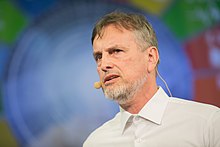于尔根·施密德胡伯
| 于尔根·施密德胡伯 Jürgen Schmidhuber | |
|---|---|
 施密德胡伯在2017年AI for GOOD全球峰會上演說 | |
| 出生 | 1963年1月17日[1] |
| 国籍 | |
| 母校 | 慕尼黑工業大學 |
| 知名于 | 人工智慧 深度學習 人工智能網路 循環神經網路 長短期記憶 哥德爾機 元學習 |
| 网站 | people |
| 科学生涯 | |
| 研究领域 | 人工智慧 |
| 机构 | 達勒·莫勒人工智慧研究所 |
于尔根·施密德胡伯(德語:Jürgen Schmidhuber,1963年1月17日—)[1]是一名德國計算機科學家,以人工智能、深度学习和人工神经网络领域的成就而知名,现任位于瑞士南部提契諾州卢加诺区曼諾的达勒·莫尔人工智能研究所(IDSIA)联合主任[2]。施密德胡伯有时被称为“(现代)AI之父”[3][4][5][6][7]或“深度学习之父”[8]。
施密德胡伯在德国慕尼黑工业大学完成了本科学业。2004年至2009年,他在瑞士卢加诺的瑞士意大利語區大學担任人工智能教授[9]。2021年10月1日,施密德正式加入阿卜杜拉国王科技大学,担任人工智能研究院院长。[10]
工作
1997年,施密德胡伯和塞普·霍赫赖特发表了关于一种循环神经网络类型的论文,他们称之为长短期记忆网络(LSTM)。2015年,LSTM被Google用于智能手机中新的语音识别实现[2]。Google也在智能助手Allo和Google翻译中使用了LSTM[11][12][13]。蘋果公司在iPhone的“Quicktype”功能和Siri中使用了LSTM[14][15][16]。亞馬遜公司在Amazon Alexa中使用LSTM[17]。2017年,Facebook每天使用LSTM网络进行约45亿次自动翻译[18]。彭博商业周刊写道:“这些能力使得LSTM成为最具商业化的AI成就,应用于预测疾病和创作音乐等方方面面。”[19]
2011年,施密德胡伯在IDSIA的团队与他的博士后丹·奇雷尚(Dan Ciresan)在快速并行计算机(GPU)上实现了卷积神经网络(CNN)的显著加速。丹·奇雷尚等人的深度卷积神经网络比CPU上的等效实现快了60倍[20],于2011年8月在计算机视觉竞赛中成为第一个超过人类表现的模型[21]。2011年5月15日至2012年9月10日期间,他们的快速深度CNN赢得了至少四场图像比赛[22][23]。他们还显著改善了文献中针对各种图像数据库的最佳性能[24]。这种方法基于杨立昆等人早期提出的CNN设计[25],已成为计算机视觉领域的核心[23]。
2014年,施密德胡伯成立了一家名为Nnaisense的公司,致力于在金融、重工业和自动驾驶汽车等领域开展人工智能的商业应用。塞普·霍赫赖特、贾恩·塔林和马库斯·哈特(Marcus Hutter)任公司顾问[2]。Nnaisense于2017年1月筹集了首轮资金。施密德胡伯的总体目标是通过在各种特定任务中顺序训练单个AI来创建通用AI。但怀疑者指出,像Arago GmbH和IBM这样的公司已经在各式项目中应用了多年的AI,但没有出现任何强人工智能的迹象。[26]
观点
根据《衛報》的报道[27],施密德胡伯在2015年发表的一篇“严厉的文章”中,指责同行的深度学习研究员杰弗里·辛顿、杨立昆和约书亚·本希奥“大量互相引用”,却“没有提及该领域的先驱者”,称他们低估了施密德胡伯自己和其他早期机器学习先驱者的贡献,包括于1965年发表首个深度学习网络的阿列克谢·格里戈里耶维奇·伊瓦赫年科(Alexey Grigorevich Ivakhnenko)。杨立昆否认了这一指责,表示施密德胡伯“总是主张他所不该得到的名誉”。[2][27]施密德胡伯本人则提出反对,声称杨立昆并没有以实例来支持该主张,并自己列出了许多成果的优先权争论加以反驳。[28]
荣誉
施密德胡伯于2013年获国际神经网络学会的亥姆霍兹奖[29],并在2016年获得了IEEE计算智能学会的神经网络先驱奖[30]。他还是欧洲科学与艺术院的成员[31][9]。
参考资料
- ^ 1.0 1.1 1.2 CV. [2019-04-07]. (原始内容存档于2020-11-13).
- ^ 2.0 2.1 2.2 2.3 John Markoff (27 November 2016). When A.I. Matures, It May Call Jürgen Schmidhuber ‘Dad’. The New York Times. Accessed April 2017.
- ^ Wong, Andrew. The 'father of A.I' urges humans not to fear the technology. CNBC. 2018-05-16 [2019-02-27]. (原始内容存档于2020-11-09).
- ^ Blunden, Mark. Humans will learn to confide in their robot friends, says AI expert. The father of modern AI believes robots could keep lonely people company. The Evening Standard. 2018-06-08 [2019-02-27]. (原始内容存档于2019-09-26).
- ^ Micklethwaite, Jamie. The day robots become smarter than humans will arrive on THIS DATE. THE day robots become smarter than humans is just round the corner, according to a man dubbed “the father of artificial intelligence”.. Daily Star. 2018-02-17 [2019-02-27]. (原始内容存档于2019-04-07).
- ^ The ‘father of A.I.’ urges humans not to fear the technology. South China Morning Post. 2018-05-16 [2019-02-27]. (原始内容存档于2020-09-21).
- ^ Sony WOW Studio at SXSW 2019, Austin, Texas: Quote: "the guest speakers include Juergen Schmidhuber, the father of modern artificial intelligence who revolutionized machine learning with his lab's deep learning neural networks and Avast Security Ambassador, Garry Kasparov who is widely regarded as the greatest chessplayer in history.". PR Newswire. 2019-02-22 [2019-02-27]. (原始内容存档于2022-05-17).
- ^ Wang, Brian. Father of deep learning AI on General purpose AI and AI to conquer space in the 2050s. Next Big Future. 2017-06-14 [2019-02-27]. (原始内容存档于2020-11-11).
- ^ 9.0 9.1 Dave O'Leary (3 October 2016). The Present and Future of AI and Deep Learning Featuring Professor Jürgen Schmidhuber. IT World Canada. Accessed April 2017.
- ^ KAUST. Professor Jürgen Schmidhuber appointed as the Director of the KAUST Artificial Intelligence Initiative. KAUST Websites. [2021-11-23]. (原始内容存档于2021-11-23).
- ^ Khaitan, Pranav. Chat Smarter with Allo. Research Blog. 2016-05-18 [2017-06-27].[失效連結]
- ^ Wu, Yonghui; Schuster, Mike; Chen, Zhifeng; Le, Quoc V.; Norouzi, Mohammad; Macherey, Wolfgang; Krikun, Maxim; Cao, Yuan; Gao, Qin. Google's Neural Machine Translation System: Bridging the Gap between Human and Machine Translation. 2016-09-26. arXiv:1609.08144
 [cs.CL].
[cs.CL].
- ^ Metz, Cade. An Infusion of AI Makes Google Translate More Powerful Than Ever | WIRED. Wired. 2016-09-27 [2017-06-27]. (原始内容存档于2020-11-08).
- ^ Efrati, Amir. Apple's Machines Can Learn Too. The Information. 2016-06-13 [2017-06-27]. (原始内容存档于2017-08-09).
- ^ Ranger, Steve. iPhone, AI and big data: Here's how Apple plans to protect your privacy | ZDNet. ZDNet. 2016-06-14 [2017-06-27]. (原始内容存档于2020-11-08).
- ^ Smith, Chris. iOS 10: Siri now works in third-party apps, comes with extra AI features. BGR. 2016-06-13 [2017-06-27]. (原始内容存档于2020-11-12).
- ^ Vogels, Werner. Bringing the Magic of Amazon AI and Alexa to Apps on AWS. - All Things Distributed. www.allthingsdistributed.com. 2016-11-30 [2017-06-27]. (原始内容存档于2020-07-27).
- ^ Ong, Thuy. Facebook's translations are now powered completely by AI. www.allthingsdistributed.com. 2017-08-04 [2019-02-15]. (原始内容存档于2020-11-27).
- ^ Vance, Ashlee. Quote: These powers make LSTM arguably the most commercial AI achievement, used for everything from predicting diseases to composing music.. Bloomberg Business Week. 2018-05-15 [2019-01-16]. (原始内容存档于2020-11-07).
- ^ Ciresan, Dan; Ueli Meier; Jonathan Masci; Luca M. Gambardella; Jurgen Schmidhuber. Flexible, High Performance Convolutional Neural Networks for Image Classification (PDF). Proceedings of the Twenty-Second International Joint Conference on Artificial Intelligence-Volume Volume Two. 2011, 2: 1237–1242 [2013-11-17]. (原始内容存档 (PDF)于2013-11-16).
- ^ IJCNN 2011 Competition result table. OFFICIAL IJCNN2011 COMPETITION. 2010 [2019-01-14]. (原始内容存档于2019-01-21).
- ^ Schmidhuber, Jürgen. History of computer vision contests won by deep CNNs on GPU. 2017-03-17 [2019-01-14]. (原始内容存档于2018-12-19).
- ^ 23.0 23.1 Schmidhuber, Jürgen. Deep Learning. Scholarpedia. 2015, 10 (11): 1527–54 [2019-04-07]. PMID 16764513. doi:10.1162/neco.2006.18.7.1527. (原始内容存档于2016-04-19).
- ^ Ciresan, Dan; Meier, Ueli; Schmidhuber, Jürgen. Multi-column deep neural networks for image classification. New York, NY: Institute of Electrical and Electronics Engineers (IEEE). June 2012: 3642–3649. ISBN 978-1-4673-1226-4. OCLC 812295155. arXiv:1202.2745
 . doi:10.1109/CVPR.2012.6248110.
. doi:10.1109/CVPR.2012.6248110. |journal=被忽略 (帮助) - ^ Y. LeCun, B. Boser, J. S. Denker, D. Henderson, R. E. Howard, W. Hubbard, L. D. Jackel, Backpropagation Applied to Handwritten Zip Code Recognition (页面存档备份,存于互联网档案馆); AT&T Bell Laboratories
- ^ AI Pioneer Wants to Build the Renaissance Machine of the Future. Bloomberg.com. 2017-01-16 [2018-02-23]. (原始内容存档于2020-11-12).
- ^ 27.0 27.1 Oltermann, Philip. Jürgen Schmidhuber on the robot future: ‘They will pay as much attention to us as we do to ants'. the Guardian. 2017-04-18 [2018-02-23]. (原始内容存档于2022-04-10).
- ^ Schmidhuber, Jürgen. Critique of 2018 Turing Award. Schmidhuber's AI Blog. 2020 [23 August 2021]. (原始内容存档于2021-12-08).
- ^ INNS Awards Recipients. International Neural Network Society. Accessed December 2016.
- ^ Recipients: Neural Networks Pioneer Award. Piscataway, NJ: IEEE Computational Intelligence Society. Accessed January 2019.]
- ^ Members. European Academy of Sciences and Arts. Accessed December 2016.